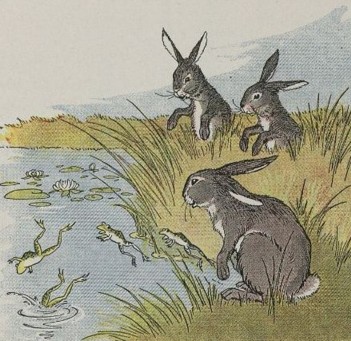PART A_1
Let’s learn vocabulary. Listen and repeat the words and the sentences with your tutor.
PART A_2
| 1. timid | /TIM-id/ |
| -shy and nervous; not brave or confident | |
| My timid friend always stays at home. | |
| 2. scurry | /SKUR-ee/ |
| -to move quickly, with small, short steps | |
| The thieves scurried their way out of the bank. | |
| 3. startled | /STAHR-tld/ |
| -surprised and slightly frightened | |
| I was startled when I saw my long-lost enemy. | |
| 4. scamper | /SKAM-per/ |
| -run with small quick steps | |
| The rats scampered after stealing food from the pantry. | |
| 5. warren | /WAWR-uhn/ |
| -a series of connecting underground passages and holes in which rabbits live | |
| The lost rabbit went to the warren. |
PART B_1
Let’s read the story. Please read them aloud, and I will check your pronunciation and intonation.
PART B_2
The Hares and the Frogs

Hares, as you know, are very timid. The least shadow, sends them scurrying in fright to a hiding place. Once they decided to die rather than live in such misery. But while they were debating how best to meet death, they thought they heard a noise and in a flash were scampering off to the warren. On the way they passed a pond where a family of Frogs was sitting among the reeds on the bank. In an instant the startled Frogs were seeking safety in the mud.
“Look,” cried a Hare, “things are not so bad after all, for here are creatures who are even afraid of us!”
“Look,” cried a Hare, “things are not so bad after all, for here are creatures who are even afraid of us!”
However unfortunate we may think we are there is always someone worse off than ourselves.
PART C_1
Let’s answer comprehension questions. Please answer them based on the story.
PART C_2
| 1. What are the Hares known for? |
| 2. What did the Hares do immediately after hearing the noise? |
| 3. What were the Frogs doing when the Hares saw them? |
PART D_1
Let’s discuss the story. Please answer the questions below and express your opinions.
PART D_2
| 1. | What is your understanding of the fable’s lesson? |
| 2. | In what situations do you become timid? |
| 3. | What is the best way to conquer fears? |
| 4. | Do you think it is okay to compare others’ problems with ours? Why or why not? |
| 5. | Have you had an experience similar to the fable’s lesson? Please share? |
REVIEW AND FEEDBACK
Now, let us review the things that you learned in this lesson.
ではこのレッスンで学んだことを振り返りましょう。
(Please give a short feedback on how your student did on your class.)
| Grammar 文法 |
Pronunciation 発音 | Vocabulary 単語 |
Comprehension 理解 |
|
|---|---|---|---|---|
 GOOD GOOD |
文法の誤りはほとんどなく、完全な文章で話すことができる | ほとんどの単語をはっきりと正しく発音することができる | 習った表現を適切に使うことができる | 文章を理解し、質問に正しく答えることができる |
 FAIR |
文法の誤りはあるが、完全な文章で話すことができる | 発音の練習が必要な言葉がいくつかある | たまにミスはあるが、習った表現を適切に使うことができる | 文章を完全に理解するのは難しく、質問に正しく答えられないときもある |
 POOR |
文章で話すのは難しく、単語だけで話すことができる | 発音の練習が必要である | 習った単語と表現を少しだけ使うことができる | 文章を理解するのは難しく、質問に答えるのは難しい |
Parts of this lesson material are based on:
An eBook from The Project Gutenberg.
This eBook is for the use of anyone anywhere at no cost and with almost no restrictions whatsoever. You may copy it, give it away or re-use it under the terms of the Project Gutenberg License included with this eBook or online at www.gutenberg.org
An eBook from The Project Gutenberg.
This eBook is for the use of anyone anywhere at no cost and with almost no restrictions whatsoever. You may copy it, give it away or re-use it under the terms of the Project Gutenberg License included with this eBook or online at www.gutenberg.org